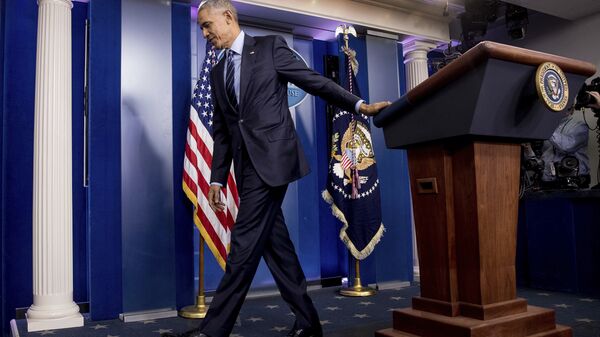MOSCOW (Sputnik) — The policy also curbed military cooperation with Russia and set conditions for the provision of military equipment for the Syrian armed opposition.
"On Friday, December 23, 2016, the President signed into law: S. 2943, the National Defense Authorization Act for Fiscal Year 2017," the White House stated on Friday.
The US Senate and House of Representatives passed the 2017 National Defense Authorization Act (NDAA) earlier in December. It increases base funding by $9 billion and provides US soldiers with 2.1-percent pay raise.
Expansion of Magnitsky Act Globally
The NDAA 2017 allows to apply the Magnitsky Act worldwide to impose sanctions on anyone Washington deems engaged in corruption or human rights violations.
"The President may impose the sanctions described in subsection (b) with respect to any foreign person the President determines, based on credible evidence is responsible for extrajudicial killings, torture, or other gross violations of internationally recognized human rights committed against individuals in any foreign country," the document reads.
The law also applies to those deemed responsible for corruption, embezzlement and other crimes.
The sanctions include inadmissibility to United States and blocking of property.
The law will be valid for six years but only the US president himself may terminate the application of sanctions with respect to a particular person and obliged to report to Congress afterwards.
The document expands the Magnitsky Act, which was passed four years ago by the US Senate and allowed Washington to deny visas and freeze assets of Russian officials allegedly involved in the death of Russian lawyer Sergei Magnitsky.
Magnitsky was accused of committing crimes under Sections 3 and 5 of Article 33, Part 2 of Article 199 (conspiracy and abatement in serious company tax evasion by a group of individuals) of Russia's penal code. On November 16, 2009, Magnitsky died in the Matrosskaya Tishina pre-trial detention center in Moscow after nearly a year-long detention.
Restrictions in Military Cooperation With Russia
The NDAA also stipulates the conditions under which the bilateral military cooperation between Russia and the United States may continue.
"None of the funds authorized to be appropriated for fiscal year 2017 for the Department of Defense may be used for any bilateral military-to-military cooperation between the Governments of the United States and the Russian Federation until the Secretary of Defense, in coordination with the Secretary of State, certifies to the appropriate congressional committees that the Russian Federation has ceased its occupation of Ukrainian territory and its aggressive activities that threaten the sovereignty and territorial integrity of Ukraine and members of the North Atlantic Treaty Organization," the document read.
Kiev launched a special military operation in Ukraine’s southeast in April 2014, after local residents refused to recognize the new Ukrainian authorities, which came to power as a result of a coup. In February 2015, the two sides reached a peace agreement after talks brokered by the leaders of Russia, France, Germany and Ukraine — the so-called Normandy Format — in the Belarusian capital of Minsk. Kiev has been reluctant to implement a number of Minsk deal provisions.
However, the law does not apply to the United States or NATO operation in Afghanistan or "any activities necessary to ensure the compliance of the United States with its obligations or the exercise of rights of the United States under any bilateral or multilateral arms control or nonproliferation agreement or any other treaty obligation of the United States."
The law stresses that no funds may be provided for any actions acknowledging Russian sovereignty over the Crimean peninsula with the only exception to be the case of the US national security.
Conditions of Provision Syrian Opposition With MANPADs
The NDAA states that Syrian opposition would only get the US man-portable air-defense systems (MANPADs) after the joint report to the Congress by the US defense secretary and the secretary of state.
"If a determination is made during fiscal year 2017 to use funds available to the Department of Defense for that fiscal year to provide man-portable air defense systems (MANPADs) to the vetted Syrian opposition… such funds may not be used for that purpose until the Secretary of Defense and the Secretary of State jointly submit to the appropriate congressional committees a report on the determination," the document read.
The report should include "a description of each element of the vetted Syrian opposition that will provided man-portable air defense systems." In addition, the geographic location, a detailed intelligence assessment and the number and type of man-portable air defense systems should be included in the report.
Earlier in December, Obama lifted the formal restrictions on the supply of arms, ammunition and military equipment to the US allies in the fight against terrorism in Syria. At the same time, the State Department stated that Washington still does not intend to supply MANPADS to the armed Syrian opposition.





